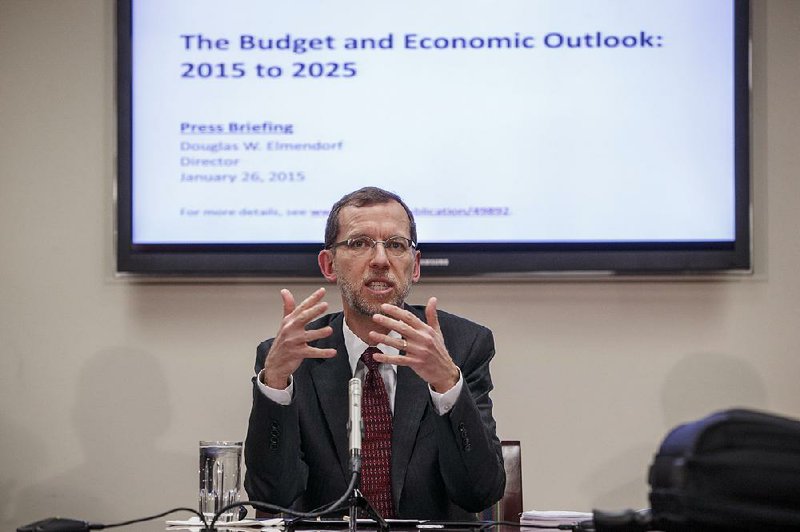With the economy still reeling and tens of millions out of work, additional federal spending shouldn't be ruled out, two former Congressional Budget Office directors told the House Budget Committee on Wednesday.
While recommending greater fiscal restraint in the long term, they opposed any short-term cuts to federal spending.
"More than a trillion dollars in additional fiscal support is warranted, with a focus on supporting unemployed households, business operations and state and local government budgets, " said Douglas Elmendorf, who led the Congressional Budget Office from January 2009 until March 2015.
The economic disruption unleashed in March has barely even begun, warned Elmendorf, an economist and dean of the Kennedy School of Government at Harvard University.
[CORONAVIRUS: Click here for our complete coverage » arkansasonline.com/coronavirus]
"This is not just a three-month crisis. This is a multiyear event," he said. "Although the country is beginning to reopen following widespread shutdowns, a great deal of economic suffering still lies ahead of us."
Douglas Holtz-Eakin, budget office director from February 2003 until December 2005, said contraction in the U.S. economy this year could rival the worst years of the Great Depression.
Recent economic figures "simply staggered the mind," he said.
"This is a big downturn. It necessitated a very big response and we've seen, as a result, large increases in the deficit," Holtz-Eakin said. "I just want to emphasize that they were necessary, they were appropriate and that, going forward, more may be needed."
Asked what would happen once the Paycheck Protection Program ends, Holtz-Eakin said, "I would expect that we will continue to lose some small businesses and we'll see increases in the ranks of the unemployed."
While large businesses have typically been able to bounce back after temporary layoffs, "I'm very worried about our small- to midsize businesses in the United States," he added.
During Wednesday's virtual hearing, ranking member U.S. Rep. Steve Womack, R-Ark., and others voiced concerns about not only the economy but also the rapidly accelerating national debt.
Speaking from his district office in Rogers, the lawmaker asked: "How do we make sure that the policies we enact are doing everything possible to boost the economy and get Americans back to work?"
Some workers are making more while on unemployment than they received when they were employed, the former Rogers mayor and others noted.
Congress should reduce, but not eliminate, the $600 in extra benefits it has given to unemployed Americans, Elmendorf told lawmakers.
"I think extending benefits in a way that does not discourage people from going back to work is crucially important," he said.
Even after the new year, "there's still going to be millions and millions of people who can't find jobs. They need and deserve support, for their own sake and the sake of the economy," Elmendorf said.
The annual deficit was on an upward trajectory even when the economy was growing and unemployment was at a half-century low.
After reaching $984 billion in fiscal 2019, it is on pace to reach $3.7 trillion in fiscal 2020, according to budget office estimates.
Noting the vast sums already approved, Womack asked: "How do we balance responsible use of taxpayer dollars with addressing the challenges we face? The $2.4 trillion in financial relief is not free money. These are taxpayer dollars that will, at the end of the day, ultimately need to be paid back to the U.S. Treasury. Future generations will bear that burden."
"We will ultimately need to raise taxes and reduce spending substantially. But we can wait to do that until we have rebuilt a vibrant economy with full employment," Elmendorf later told lawmakers.
The national debt was just over $19.9 trillion on Jan. 20, 2017, the day Donald Trump became president. Last month, it reached $25 trillion.
There's room to spend even more, Elmendorf said, in part because interest rates are so low.
"Despite the very large amount of outstanding Treasury debt, the U.S. government has sufficient fiscal capacity to provide trillions of dollars of further stimulus," he said.
Metro on 06/04/2020
